Facebook has a built-in audience of 2.7 billion people. So, if your affiliates promote your brand on Facebook, think of your store’s reach and revenue! This is why Facebook Affiliate Marketing is so hyped. With Facebook affiliate tips, you can encourage your affiliates to run Facebook ads, reels, and stories for your brand.
In this blog, I have shared how Facebook Affiliate Marketing can help you maximize your revenue and reach. This will give you clear insight into how Facebook can help you build a stronger niche online. Let’s take a deep dive into the content.
Transform Your Facebook Affiliate Marketing Today! Use Afflr to automate workflows and enhance results. Start Now!
What is Facebook Affiliate Marketing?
Simply, Facebook affiliate marketing is a strategy through which store or business owners promote their affiliate marketing on Facebook. Affiliates share unique links to the store’s products or services on their Facebook pages, groups, or ads.
When someone clicks the link and makes a purchase, the affiliate earns a commission, and the store gains a sale. It is a win-win system where Facebook Affiliate Marketing acts as a platform to increase traffic, increase visibility, and generate more sales through affiliate efforts.
Pros and Cons of Affiliate Marketing on Facebook
When I started exploring Facebook, to know more about Facebook Affiliate Marketing I came to know about the strengths and weaknesses of using Facebook for Affiliate Marketing. Here I have pointed out a few pros and cons of Facebook Affiliate Marketing;
Pros of Facebook Affiliate Marketing
1. The Active Crowd:
Even though Genz people are less active on Facebook, there is always more number of people who still opt for Facebook. I found more number of active users on Facebook.
2. Engagement:
What makes Facebook more special is the interaction offered. I have built relationships with people through direct messages. I was able to easily interact with people.
3. Cost-Effective Advertising:
On Facebook, running ads doesn’t cost more. I can target specific demographics, and run repeated campaigns as well.
4. Multiple Content Formats:
I was able to use various forms of content to reach people. It can be a video post, reel, story, or even product tutorials and how-to guides.
5. Connect with end users:
When you know what people need, you can bring a well-planned outcome. On Facebook, through its interactive features like direct messages and groups, I was able to easily connect with people and know their perspectives.
6. Ease of use:
Creating an account on Facebook was very simple. You will just have to fill in your basic details and get started in surfing through.
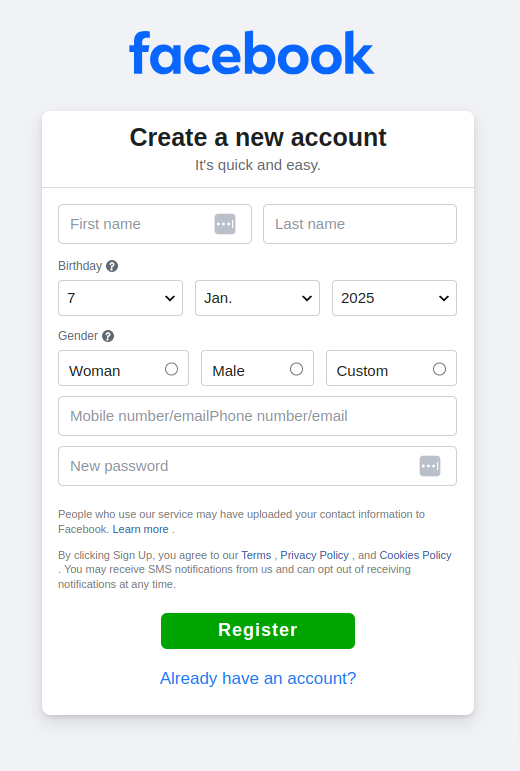
Cons of Facebook Affiliate Marketing
Facebook is indeed a great tool for affiliate marketing on social media. But I came across certain difficulties and I wanted you to know about them. Here are the cons of Facebook Affiliate Marketing;
1. Organic Reach:
Even though organic reach is still possible on Facebook, I was unable to reach out to the Genz crew on Facebook. This is one of the main problems that I faced on Facebook.
2. Algorithm Dependence:
Facebook’s algorithm was unpredictable for me. I had posts that performed very well one week and fell flat the following week.
3. Strict Policies:
Facebook ads have certain strict policies and only when you follow those your ads will run. There are cases where ads get rejected, as it is not clear.
4. High Competition:
Not only me but so many people promoted their brands. So I had to face heavy competition in showcasing my brand to people.
On the whole, using Facebook for Affiliate Marketing for me was a mixed bag. The platform provides incredible potential for you to promote your brand. However, you might also face certain challenges like algorithm dependence, and policy restrictions.
If you are about to start Affiliate Marketing on Facebook, I would recommend you start small, learn the ropes, and then find out what way suits you the best.
Creating and Growing a Facebook Audience for Your Store’s Affiliate Program
Initially, I thought using Facebook for Affiliate Marketing was as easy as creating an affiliate link, posting it, and seeing sales roll in. But, I realized that it takes effort, and a clear strategy to build a genuine audience. I followed the trial and error method to find what the audience needed. Here is what worked for me;
1. Set a clear Strategy:
Know, learn, and research about the needs of your audience. Understand what they expect from you and deliver them the outcome. I understood that the audience will focus only on the outcome you offer them.
What I did:
- Identified my target audience( based on demographics).
- Decided on the content mix ( product tutorials, videos, blogs, etc.,)
2. Set Up a Facebook page or Group:
You can use a Facebook page or group for postings.
What I did:
- Facebook pages are relevant for creating brand awareness and running ads.
- Facebook groups can help you in building a community who can interact on their needs and foster deep conversations.
3. Posts that add value:
I wanted to find what people love the most. So I experimented by watching people post videos, reels, stories, and product tutorials. This helped me to find out which format of content works well for me.
What I did:
- Sharing stories of my affiliates to inspire others.
- Addressing common questions about how to create an Affiliate program and providing answers for people.
4. Use Facebook Ads wisely:
Running ads on Facebook might feel so big at the start. But I started small and learned the tricks on which ad collects more conversions.
What I did:
- Running ads that get more attention on a repeated campaign.
- You can use the Shopify popup apps to grab affiliate’s attention.
- Conversion ads – Driving traffic to the affiliate program’s signup page.
5. Engage With your Audience:
As a store owner, you will have to know the customer’s requirements. So I started to make it interactive.
What I did:
- Posting Q&A in Facebook Groups.
- Running polls to see people’s choices.
Facebook Pages vs. Facebook Groups: What Works Best for Your Store’s Affiliate Program?
While starting your Facebook Affiliate Marketing journey, you may have to decide whether to post on your Facebook page or Facebook groups. Even I faced the same issue. Both these choices felt like solid options. Choosing between these was difficult as they serve different purposes. Let me tell you which one works better for store owners like you;
Facebook Pages
Facebook Pages are like the front end of your affiliate program on Facebook. It is more like a business card. It tells people about who you are, and what services you provide. When I set up my Facebook page, I found it very easy to run ads and post content on my page.
Things I liked about using Facebook Pages:
- Ad-Friendly: It is very easy to run ads on Facebook pages. You can promote links, enhance conversions, and drive results to your store.
- Appearance: You will have a professional appearance in the market. You can maintain a neat profile among people. This will help you to build a reputation for your brand.
- Analytics: You can find detailed analytics of your post. You will get insights about the reach of your post. This can help you to know where you have to improve on your posts.
Downsides of Facebook Pages:
- Organic reach: Reach was a major problem. If I was unable to post or run ads only a few people saw my updates.
- Interactions: People interacted well. But it was like a news feed and not like a community.
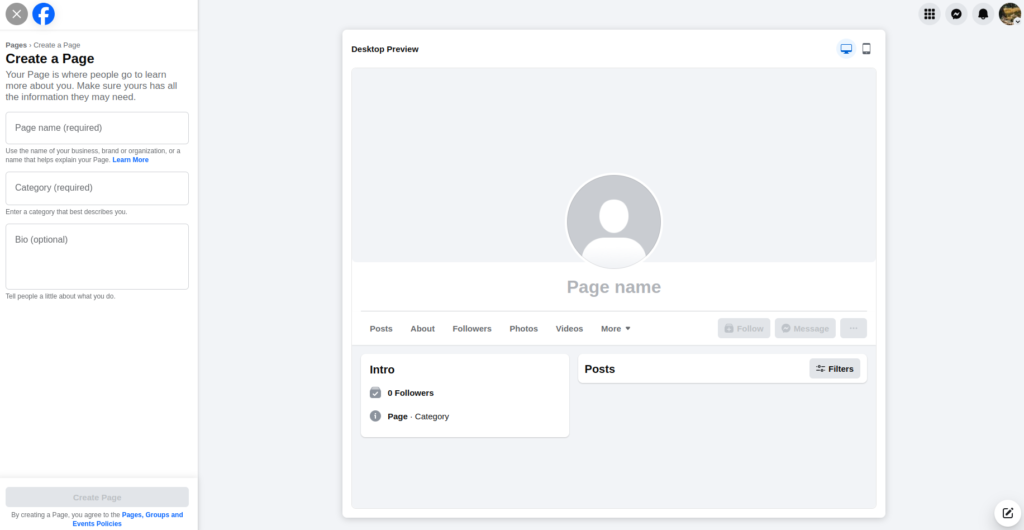
Facebook Groups
Facebook groups hold an entirely different vibe. I found it so informative and interactive. Groups were so helpful in fostering relationships with affiliates. This was a big advantage for me to learn more.
Things I liked in groups:
- Community Groups: Facebook is a perfect tool for building communities. Affiliates can share their experience, ask questions, and also help others out.
- Better Visibility: Group posts have a higher reach. So I increased to post more on groups and it made my results skyrocket!
- Peer-to-peer support: There will be many people of various age categories. I saw peers supporting each other and helping people out there.
Downsides of Facebook Groups:
- Managing Groups: Managing groups took me, more time and effort. I had to spend more time answering questions and keeping the discussions going.
- Promoting Ads: Groups are not ideal for running ads. It is hard to promote products in groups, unlike Facebook pages.
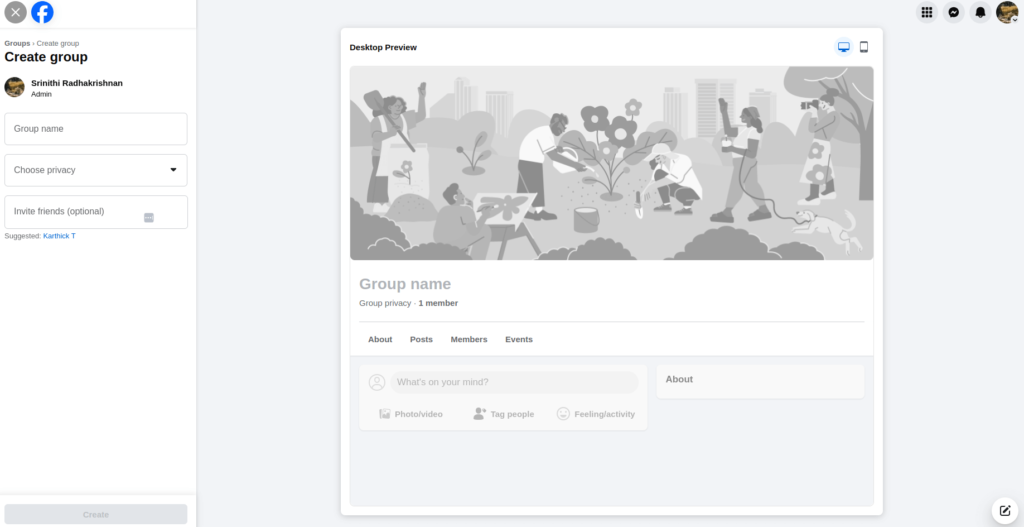
Integrate Effortlessly with your favorite tools for a supercharged Afflr experience on Facebook. Start Now!
Setting Up a Facebook Business Page for Your Shopify Store
When I first started to set up a Facebook Business Page for my Shopify store, I was entirely clueless about how to start my Affiliate Marketing on Facebook. After a certain trial and error process, I nailed out how to create a Facebook business page for the Shopify store. I figured out, how it works from the Shopify affiliate marketing for beginners guide.
Setting Up a Page
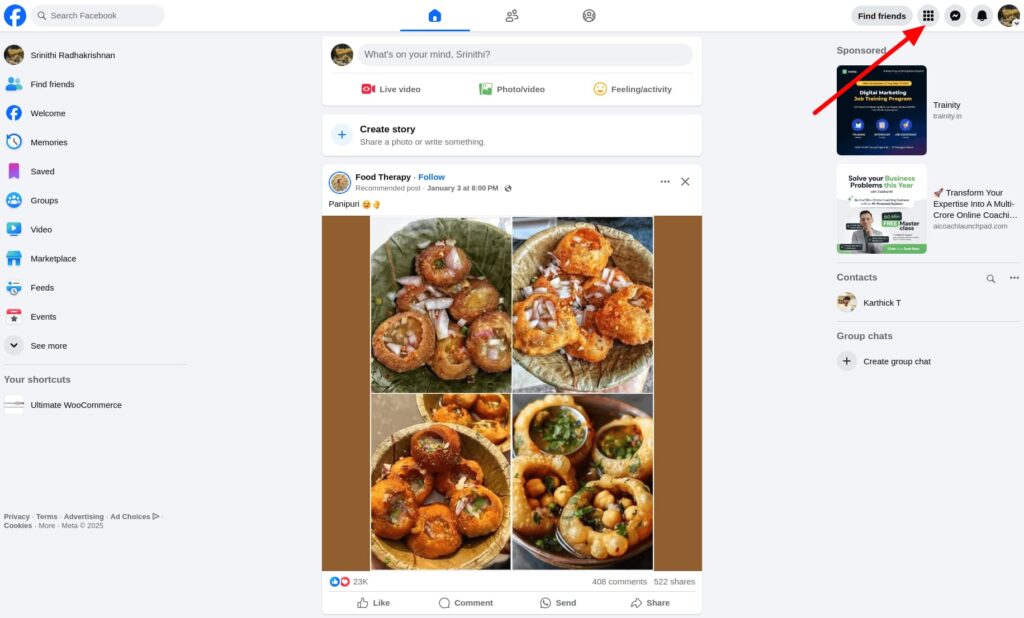
After creating your Facebook account, your homepage will look like the above. In the top right corner, you will find the main menu. In that, you can find options to create a Facebook page.
Creating a Facebook Page
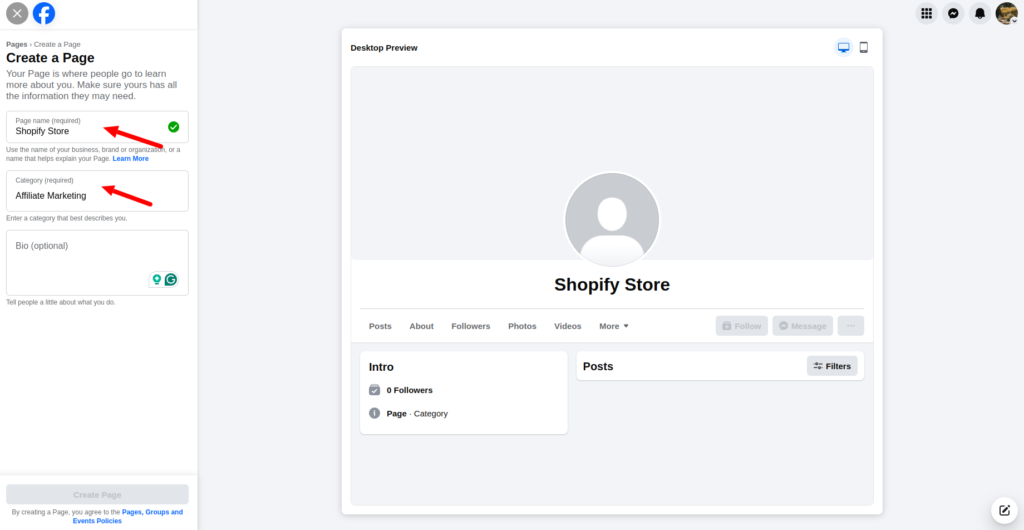
You will see the options to create your store on Facebook. You will have to provide your store name and category.
The Final Setup
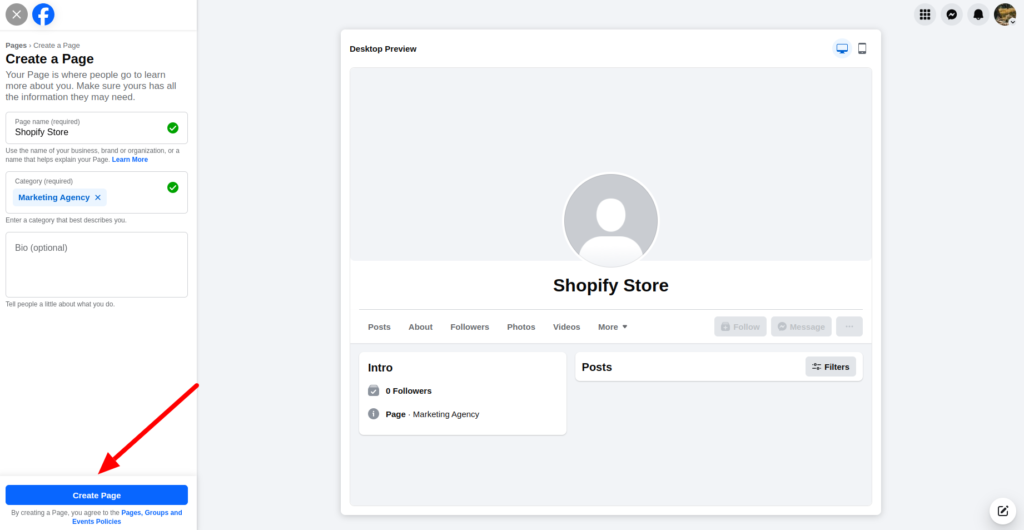
After providing the required details, you can click on the Create Page button.
Pro Tip: I customized my Facebook page with a cover photo and my profile. Also, I had my bio updated to make my profile look professional. You can use banner sliders from Shopify on your page to get affiliates in.
Setting Up a Facebook Group to Build a Community for Your Store
The thought I had in my mind when I started a Facebook group was: “ Will this work out?”. But it does. Setting up your Facebook group is an easy process. You can build a community of genuine people. Here is a step-by-step process for setting up your Facebook group;
Creating the Group
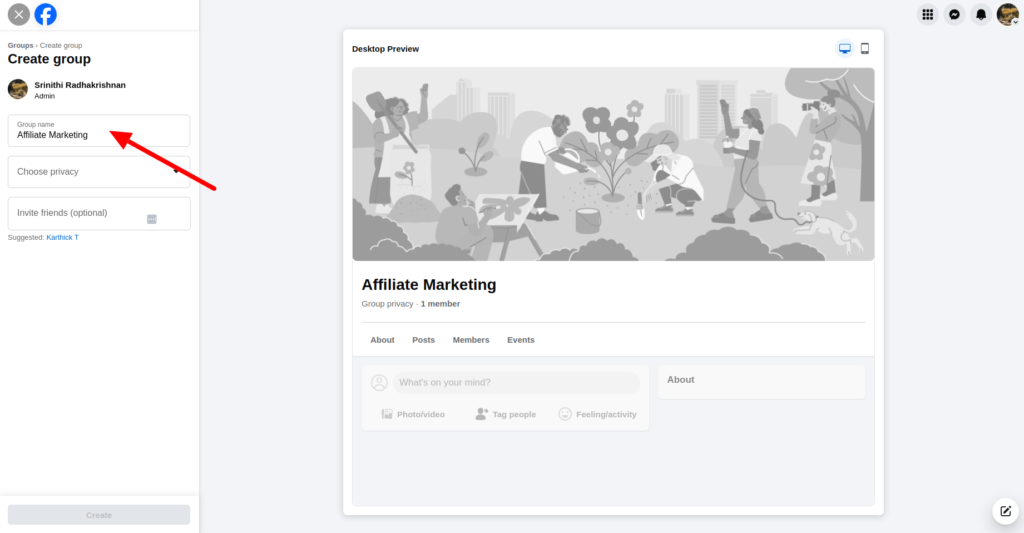
Like creating a Facebook page, you will find the main menu in the top right corner. You can click on the group button and create a group.
Setting up your Facebook group
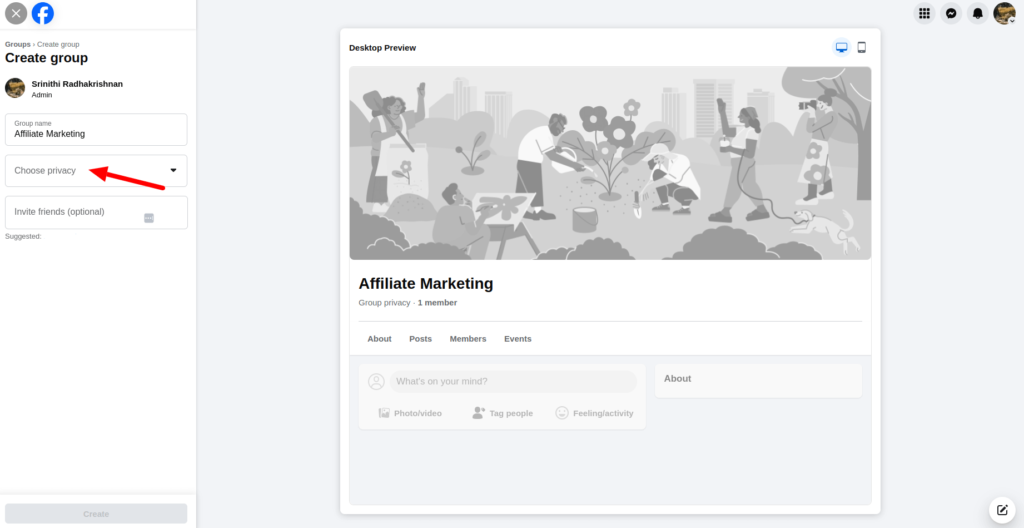
You can also customize if you have to make your group private or public.
Pro Tip: Making your groups private, can make your affiliates and also people feel that they are in a special community. They feel upgraded.
The Final Setup
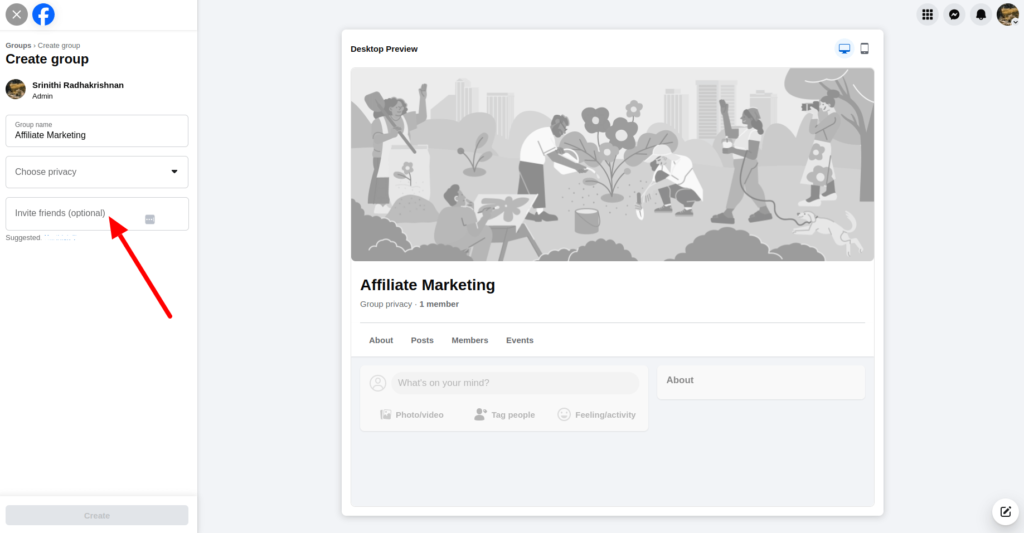
You can also invite your friends to be a part of your Facebook group. Get popular among your peers first. Get your friends inside the group and make them understand about your products. If they are attracted they may also recommend your products to others. Word-of-mouth marketing helps you build a wider community.
Organic Strategies for Attracting Affiliates on Facebook
I didn’t have a lot of money to run paid ads initially. So I wanted to explore some other ways to attract affiliates and keep affiliates engaging. You can use the Shopify Ads App to learn more about running ads. I have listed down the things that I figured out;
Build an active Facebook business page:
- Having an active Facebook business page can help you keep your audience engaged.
- You can also customize your page by adding relevant call-to-action to your page.
- You can also update the About section or your bio to quickly capture the attention of your target audience.
Use groups to find affiliates:
- Identify the right groups to choose your affiliates. Find out the best Affiliate partners for your store and maximize your revenue.
- You can engage in groups related to Facebook affiliate marketing and gain insights.
- Through these steps, you can finally create your Facebook group with trusted affiliates.
Partner with Influencers:
- You can reach out to influencers to promote your brand.
- People trust influencers, so it is important to adapt to influencer marketing.
- In this way, you can gain popularity among your niche.
Promote your Affiliate Program:
- You can use engaging posts to promote your affiliate program.
- This post can be a reel, story, product tutorial, or a how-to guide.
- Find out which content format is highly effective among people to maximize your reach.
Promote Affiliate Links:
- Encourage your affiliates to promote affiliate links.
- You can attract new affiliates by providing different types of affiliate commissions for their referrals.
- This can earn them a commission and a sale for you as a store owner.
Case Study: Creating Brand Awareness by Using Facebook as a Marketing Tool
As of the holiday season of 2017, Pandora sought to increase brand awareness in Germany and see whether Facebook video ads were capable of duplicating the success that other formats had found.
What They Did:
- Pandora repurposed a successful TV ad into a 15-second video that was specifically catered for Facebook.
- This was cropped to a square for mobile and ran targeting German users aged 18-50 with placements in newsfeeds and in-stream video ads.
Things to learn from it:
This case taught me how Facebook for affiliate marketing is powerful. Here’s why:
- Videos Work: Short, emotional videos grab attention and resonate with audiences.
- Repurpose Content: Instead of creating new ads, use what you have and adapt it.
- Optimize for Facebook: Tailoring content for mobile.
The Outcome:
Using this approach for affiliate marketing on Facebook can:
- Boost brand awareness.
- Improve audience connection and trust.
- Drive more conversions and ROI.
With content optimization for Facebook and targeting the right audience, you can also drive results like Pandora using Facebook as your marketing tool.
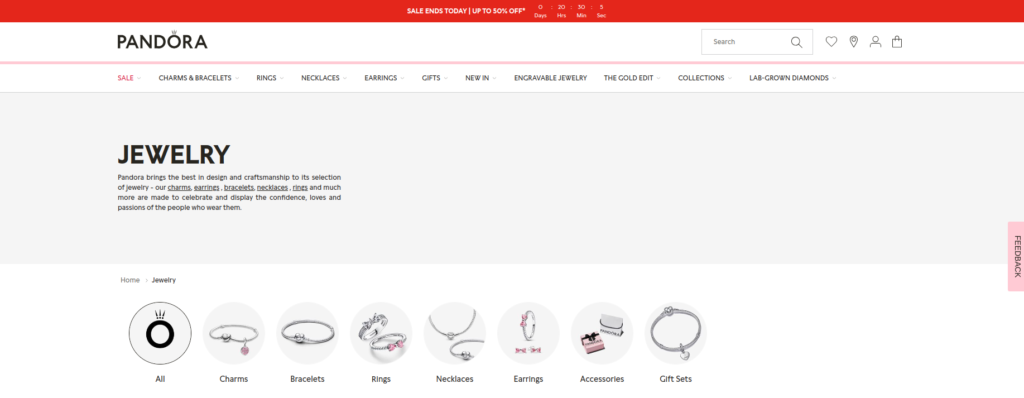
Common Mistakes Store Owners Make in Facebook Affiliate Marketing
When I first got into Facebook Affiliate Marketing, I made my fair share of mistakes. But looking back, those errors helped me to learn a lot and also help people. I have listed some of the common pitfalls that store owners may face;
1. Targeting:
Initially, I posted ideas that ignored my target audience. I posted for a wider audience. But it doesn’t work. Only when you analyze your target audience you can get focused results.
2. Ads:
Overloading and overinforming about your store in the ads may not bring you sales. This is because your customers won’t get attracted to your ads. Facebook users scroll quickly, so you need to have eye-catching, clear, and concise information in your ad.
3. Mobile Optimization:
Your Facebook page or group may look better on desktops, but not on mobiles. Many store owners ignore this point. People mostly use their mobile phones than desktops or laptops. So it is necessary to make it optimized on all devices.
4. Tracking:
Always have a habit of tracking and analyzing how your posts perform. Only when you come to know about the outcome of your post you can enhance it further.
Automate sign-ups and track affiliate sales effortlessly – Empower your Facebook store with Afflr now!
Conclusion
In this blog, I have given you the most information about how to start your Facebook Affiliate Marketing. From setting up Facebook pages to common mistakes you should avoid, everything is been listed about affiliate marketing on Facebook. Make use of these insights and make sure you build a very strong community for your Shopify store.
Further Reading
- How to Find Affiliate Marketing Partners for Your Shopify Store?
- Quick Start Guide: Affiliate Marketing for Shopify Beginners
- How to turn customers into brand advocates in Shopify?
- Proven Strategies for Fueling Shopify Affiliate Growth in 2024
Frequently Asked Question
Yes, Facebook Affiliate Marketing is available for all users. It follows the given advertising and community guidelines that govern your content transparency and compliance.
In Facebook affiliate marketing, always disclose affiliate links to comply with FTC guidelines. Use clear phrases like “This post contains affiliate links” to maintain transparency and build trust with your audience.
Yes, Facebook ads are worth it for Facebook affiliate marketing. They increase visibility and engagement by targeting the audience precisely and having a broad reach. Optimize your campaigns to ensure a good return on investment.
To start with Facebook affiliate marketing, join affiliate programs in your niche. Share affiliate links through engaging posts, stories, or ads, and focus on growing your audience and building trust for conversions.